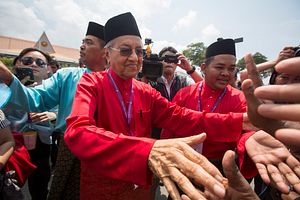Malaysians go to vote on May 9 in the most controversial and “hot” elections in the 60 years of democracy since the country’s independence.
The governing coalition, which has ruled throughout the democratic history of Malaysia, making it the longest ruling party in a democratic country, faces an opposition led by ex-Prime Minister Mahatir Mohamad, now turned against his former protegee, Najib Razak, who faces massive allegations of corruption in the 1MDB scandal.
The opposition called for a Malay tsunami that would overthrow the current ruling party, but the ruling Barisan Nasional is determined to win the elections at any costs.
Shortly ahead the dissolution of the parliament in March, the government hastily passed two controversial laws that sparked outrage in the civil society. First, the government approved the redelineation of the constituencies’ borders, which prompted accusations of gerrymandering toward the Electoral Commission. The new borders cramped Malay voters into smaller constituencies and opposition voters into larger constituencies. Mere days later, a “fake news” bill accompanied by a public campaign followed, further restricting freedom of expression in a country that already had sedition laws in place.
The election campaign itself was marked by racially and religiously divisive speech on both sides, in an attempt to win votes. PEMANTAU, a civil society group observing the electoral process, identified politicians who have constantly used race and religion as political tools to gain votes from the members of their constituencies. “We condemn these politicians, especially Dato’ Sri Mohd Najib Tun Razak, the Chairperson of Barisan Nasional and the caretaker prime minister of Malaysia, who has been consistently using racial and religious politics in his political campaign,” representatives of PEMANTAU declared in a press statement. “We believe…[this]…not just promotes but normalizes racism and racial discriminations in the country, which further erodes the social fabric that binds Malaysians.”
The Coalition for Clean and Fair Elections (BERSIH 2.0) and ENGAGE civil groups are alarmed by major flaws discovered in the electoral roll, which further call into question the integrity of the elections and the Electoral Commission’s failure to ensure clean and fair elections. Among the major irregularities, research conducted by the groups found out that in over 500,000 cases multiple voters were registered at the same address and that up to 15 percent of the voters were registered without addresses (2,123,973 cases). “These irregularities are nothing new,” noted the group, “and were addressed to the EC since 2011. And yet, we are extremely concerned that these irregularities continue to persist.”
Dubbed “the mother of all elections,” this year’s race is tight between the two political titans. According to the latest poll released by Merdeka Center, Mahatir’s opposition coalition is set to win 43.7 percent of the popular vote in peninsular Malaysia compared with 40.3 percent for Barisan Nasional, the ruling coalition. The result hinges on the votes of the Muslim Malay majority, which traditionally would go to the ruling coalition but might swing to the opposition in response to increasing living costs and corruption scandals enveloping the government leader.
Alexandra Radu is a photojournalist based in Kuala Lumpur.













































